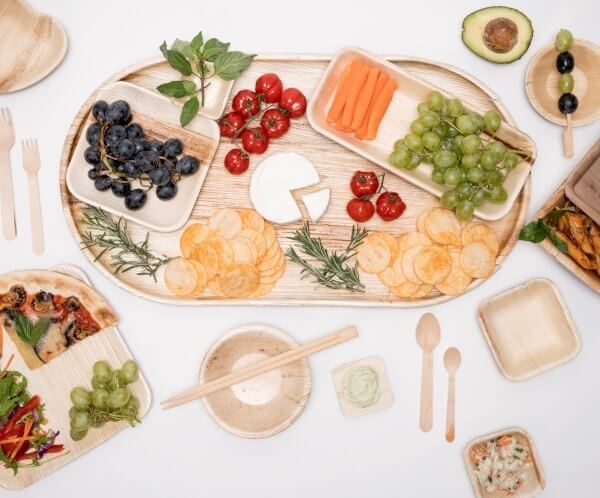I recently attended a function that highlighted our over-dependence on disposable plastic items. It was a joyful atmosphere, with colourful decorations, children running around, adults chatting, and hot puris and chole being served. The serving ware was disposable to make cleaning a breeze at the end. Rima, who loved to puncture a hole in the puri and eat the crispy top bit before dipping the rest in chole, yelled out, “There’s a hole in my plate!” The host hastily said, “Let me give you another plate and puri”, taking away the foam plate with a gaping hole where the puri had been. The chatter in the room resumed soon after, but I couldn’t stop thinking about the ingrained disposable culture we’ve got ourselves into.
Plastic has found its way into the oceans, where it’s killing marine life; it then disintegrates into micro-plastic bits that get into the fish and food that we consume. And it has found its way into our lives on a daily basis – through supermarket packaging, straws and disposable coffee cups and plates, takeaway containers…the list is endless!

In the above instance, the polystyrene foam had stuck to the puri and made it inedible; but more often, plastic finds its way into our body rather insidiously. Plastic containers in which we store, or carry food, can leach harmful substances into the food, especially when it’s hot. BPA, or bisphenol A, is an industrial chemical found in many plastics used for food containers and water bottles, and it has been known to cause ill effects on the brain, behaviour and prostate glands of foetuses and young children.
How can we reduce our over-dependence on plastic when its use is so ubiquitous? Especially since a disposable manner of using plastic is causing so much harm to our health and to that of the world we live in.
Thinking about food and present day supermarkets, can you imagine a world without the convenience of plastic packaging? The strength, mouldability and light-weightedness of plastic has made it a useful product, but what can we use instead?
Let’s look at alternatives to some of the most used plastic disposables and have a think back to how we once managed before plastics came on the scene.
Alternatives to plastic straws: Refuse plastic straws when you order a drink, remember to carry a couple of eco-friendly straws with you – stainless steel, paper or bamboo straws are good for the environment and they look really chic! Or you can drink straight from the can or cup.

Alternatives to disposable coffee cups: Most of these are lined with plastic, so choose bio-degradable cups or bring your own. Better still, take time to sit down for a proper cuppa and watch the world go by!
Alternatives to disposable serving ware at parties: Buy compostable ware and make sure you toss them into your backyard compost. Alternatively, participate in Share Waste and drop them off with a neighbour who composts. ‘Say No’ to plastic plates and cups. And an even harder ‘no’ to foam/polystyrene ware.

Alternatives to plastic zip-lock bags for sandwiches: Use brown paper bags, carry the sandwiches in your own lunch box or use reusable beeswax cloth-lined wrappers or sandwich bags.

Alternatives to brushes and scrubs: Plant-based cleaning brushes are a great alternative to plastic bristle-brushes. Remember the loofah we used to rub everything, from utensils to our own bodies? You can get these and similar products made of agave cactus, sisal, jute, cotton, coconut coir, hemp and other natural fibres.
Did you know most kitchen sponges are made from polyurethane, which is a petroleum-based product? To mop up wet spills or wipe your kitchen counter-top, you can easily replace sponges with rags made out of old materials such as towels and T-shirts. They’re soft, and this is a much better use of them (instead of discarding them after a few uses). If you like your rags to be pretty and you have some craft skills, then check out Youtube videos; you’ll find a plethora of ideas on how to make knitted or crocheted sponges!
To reduce use of single-use plastic, carry your own cloth bags and totes. Always ensure you have a few cloth bags in your car boot, in case a sudden shopping expedition beckons!
“I need plastic bags to line my rubbish bins” is an excuse I often get when I ask my friends to not accept plastic bags. You don’t really need bags to line your bins.
Compost wet kitchen waste in your garden, feed the worm farm, or use a Bokashi bucket if you live in an apartment. Recycle all paper, glass and metals in the yellow recycling bin, and soft plastics in the special red bin at most supermarkets. That will leave you with very little waste to consign to the red-lidded bin which ends up in landfill. For such dry waste you can easily line your bin with paper or not use any liners at all. It all comes down to how much effort you want to put towards making this world a better place. And that’s what we all ultimately want, don’t we?
Another great outcome of using environment-friendly products is that many of these businesses are set up as social enterprises which support local employment, employ women and revive traditional crafts.
So the next time you have a party, head to shops or online Australian stores such as Keeo, Biopak and Going Green Solutions. Have a blast and keep creating ripples of goodness that will make being ‘eco-friendly’ the new normal.
Making a case for eco-friendly alternatives to disposable plastic

Reading Time: 4 minutes



